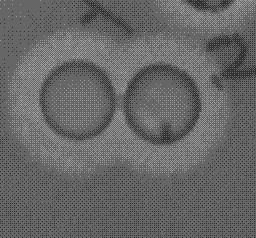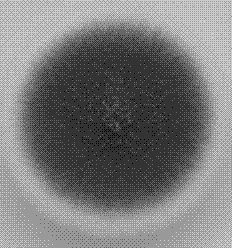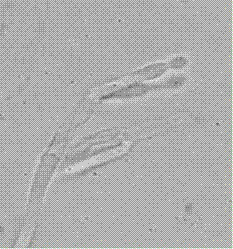Penicillium expansum strain for degrading liquor distillers' grain cellulose
A technology of distiller's grains and Penicillium extensa, which is applied in the biological field and can solve the problems of poor cellulose degradation ability, unstable enzyme activity, and high cost of enzyme production
- Summary
- Abstract
- Description
- Claims
- Application Information
AI Technical Summary
Problems solved by technology
Method used
Image
Examples
Embodiment 1
[0069] Example 1 Screening of Penicillium extensa strains for degrading distiller's grain cellulose
[0070]After the microorganisms in the distiller's grains and soil samples are enriched and cultivated, they are gradually diluted to an appropriate concentration and applied to the screening medium, cultivated at 30°C for 3-4 days, and then pick a single colony and transfer them to the slant medium for 30°C. -4 days, then streaked into the screening medium and cultivated at 30°C. After the growth of a single colony, add its mass fraction of 1% Congo red solution for staining for 2 hours, and then decolorize it with a mass fraction of 1% NaCl solution for 1 hour, and observe whether there is any The generation of the transparent circle, and record the size of the diameter of the transparent circle and the diameter of the colony, such as figure 1 . Select the strain with a larger ratio of the diameter of the transparent circle to the diameter of the colony for re-screening. In...
Embodiment 2
[0079] Example 2 Penicillium expansum CGMCC NO.7275 18S rDNA sequencing
[0080] The distiller's grain cellulose-degrading strain N53 obtained in Example 1, that is, the CGMCC No. 7275 strain, was entrusted to Jinan Lige Technology Co., Ltd. to perform 18S rDNA sequencing.
[0081] The experimental method is: pick the slant culture and put it in 700 μl 65°C preheated FPCB Solution and 7 μl β-mercaptoethanol, centrifuge in a water bath at 65°C to take the supernatant as a template, use UNIQ-10 Genomic DNA Preps Kit, and use NS1 and NS6 as templates. Primers to amplify the target fragment. Take 5 μl for agarose gel electrophoresis, use UNIQ-10 Spin Column DNA Gel Extraction Kit to cut the gel and recover the target fragment, and use Seq Forward and Seq Reverse Seq Internal as primers to perform DNA sequencing on the recovered product.
[0082] Sequencing results: the nucleotide sequence of Penicillium expansum (Penicillium expansum) CGMCC NO.7275 18S rDNA sequencing is shown in...
Embodiment 3
[0126] Example 3 Application of Penicillium expansum CGMCC NO.7275 Strain
[0127] Transplant the Penicillium expansum CGMCC NO.7275 strain to the slant for activation;
[0128] Configure the slant medium according to the composition of the above slant medium, and after streaking at 30°C for 3-4 days, pour sterile water and scrape the spores to prepare the spore suspension. Liquor distiller's grains 10-90 g / L, bran 10-90 g / L (the ratio of the two can range from 1:9 to 9:1), soybean meal 5-40 g / L, (NH4)2SO4 0-20 g / L L, KH2PO4 0-4 g / L, MgSO4 7H2O 0-1.5 g / L, GaCl2 2H2O 0.05-1 g / L, MnSO4 H2O 0-0.4 g / L, ZnSO4 7H2O 0-0.2 g / L, Composition of pH 4.0-8.0 medium Prepare fermentation medium, the initial cellulose content is 248g / L (according to the previous content of bran and distiller's grains, change appropriately), the liquid volume in a 250ml triangular bottle is 30ml, steam sterilization at 121°C for 20 minutes , cooled to room temperature, inoculated with 1ml of spore suspension...
PUM
 Login to View More
Login to View More Abstract
Description
Claims
Application Information
 Login to View More
Login to View More - R&D
- Intellectual Property
- Life Sciences
- Materials
- Tech Scout
- Unparalleled Data Quality
- Higher Quality Content
- 60% Fewer Hallucinations
Browse by: Latest US Patents, China's latest patents, Technical Efficacy Thesaurus, Application Domain, Technology Topic, Popular Technical Reports.
© 2025 PatSnap. All rights reserved.Legal|Privacy policy|Modern Slavery Act Transparency Statement|Sitemap|About US| Contact US: help@patsnap.com



